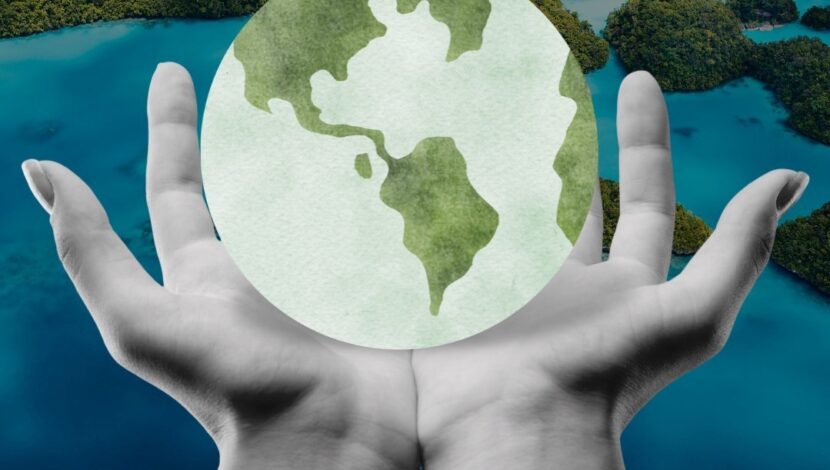The Unitarian Universalist Service Committee advances human rights through grassroots collaborations.
What the ICJ Resolution Means and Why It Matters

By Mike Givens on April 6, 2023
May 2023 Update: Want to learn more about #ClimateJustice, human rights, and intergenerational equity? Check out the Youth Climate Justice Handbook! This document is a response to the ICJAO request and provides progressive arguments for states to submit to the ICJ. Available at pisfcc.org/handbook
On Wednesday, March 29, the United Nations General Assembly (UNGA) voted affirmatively on a resolution requesting the International Court of Justice (ICJ) offer an advisory opinion about the obligation of states in addressing the impacts of climate change.
This is an historic victory for those working in the climate justice movement and introduces a new mandate for definitive action on climate change on an international level.
UUSC, its partners, and members have been consistently advocating this Resolution and to see it come to fruition inspires hope that we can take collective action to address the climate crisis.
How Did We Get Here?
The nation of Vanuatu in the South Pacific has consistently been ranked as the nation with the most disaster risk when it comes to the impacts of natural disasters. Vanuatu is an archipelago, a small cluster of islands, and its roughly 80 islands have a population of just over 300,000 people.
Living at the literal forefront of the climate crisis, for several years the nation of Vanuatu has been working diligently to call attention to the extreme rainfall, flooding, and coastal erosion decimating the nation’s infrastructure and displacing thousands.
The Vanuatu ICJ Initiative reported that, “…recent weather events—such as two back to back Category 4 Cyclones Judy and Kevin in 2023, as well as Category 5 Cyclone Harold in 2020—have destroyed homes and entire villages, resulted in loss of life, and wiped out a third of Vanuatu’s GDP (gross domestic product) in a single day.”
In 2015, Cyclone Pam damaged 64 percent of the nation’s GDP. With the increase in natural disasters, Vanuatu’s communities often experience compounding impacts—recovery from one storm will be incomplete when another storm comes along. With this trend being ever-present, Vanuatu’s ability to develop services for its people will always be compromised as funds will need to be diverted from critical programs to recovery efforts in the wake of natural disasters.
Estimates predict that by the middle of the 21st Century, the islands of Vanuatu will be uninhabitable. Given the crisis point the nation is experiencing, it has spent several years attempting to call attention to the harsh impacts of climate change and asking nations the world over for support in addressing these impacts.
Vanuatu, Antigua and Barbuda, Costa Rica, Sierra Leone, Angola, Germany, Mozambique, Liechtenstein, Samoa, Federated States of Micronesia, Bangladesh, Morocco, Singapore, Uganda, New Zealand, Vietnam, Romania, and Portugal all joined together to request the UNGA urge the ICJ to release an advisory opinion providing guidance to the nearly 200 member nations of the UN on addressing the climate crisis.
UUSC partner Pacific Island Students Fighting Climate Change (PISFCC) and other civil society organizations across the world have spent countless hours working with the Republic of Vanuatu and the more than one dozen other nations on advocating this vital resolution.
On March 29, the resolution was tabled and approved by consensus by the General Assembly. This massive victory came to fruition because of the work of Pacific island states, like minded developing nations, and developed nations, all of which are experiencing climate change disproportionately.
What Does the Resolution Mean?
Even prior to the passage of the resolution, international law contained language around human rights and protecting the environment. With this resolution, the ICJ will clarify international laws and the role of countries around the world to meet the obligations of protecting current and future generations from the impacts of climate change.
The Initiative also states, “ICJ Advisory Opinions carry great legal weight and moral authority. They are often an instrument of preventive diplomacy and have peace-keeping virtues. Advisory opinions also, in their way, contribute to the elucidation and development of international law and thereby to the strengthening of peaceful relations between States.”
The hope is that the Court will clearly establish the climate obligations of states in past, present, and future as well as clarify the consequences for failing to meet or breaching these obligations. A successful advisory opinion on climate change will help to educate and empower governments, judiciary bodies, and concerned citizens to strengthen accountability and ambitious climate actions.
What Are the Next Steps?
While a significant victory, it has not come without its detractors. The United States and China are two major global polluters and were not one of the more than 130 nations that backed the resolution. Neither nation expressed support for the resolution, but did not object to its passage on March 29. While arguments were being made for and against the resolution, both nations espoused reservations around its efficacy if passed.
In response to the resolution, in fact, the United States Mission to the United Nations said, “We have considered this carefully, recognizing the priority that Vanuatu and other Small Island Developing States have placed on seeking an advisory opinion from the International Court of Justice with the aim of advancing progress towards climate goals.
“However, we have serious concerns that this process could complicate our collective efforts and will not bring us closer to achieving these shared goals. We believe that launching a judicial process—especially given the broad scope of the questions—will likely accentuate disagreements and not be conducive to advancing ongoing diplomatic and negotiations processes. In light of these concerns, the United States disagrees that this initiative is the best approach for achieving our shared goals, and takes this opportunity to reaffirm our view that diplomatic efforts are the best means by which to address the climate crisis.”
Despite the United States’ lack of support, the adoption of the resolution is a huge victory for UUSC and its partners. The resolution is on its way to the ICJ and governments will be invited to submit opinions to the Court. Proceedings might begin as early as September 2023, with the hearings happening in 2024, and an advisory could be handed down in early 2025. However, this timeline is predictive and has not been formalized.
The work continues. UUSC, its partners, and allies will need to encourage the U.S. government to support the Court’s deliberations, to engage in good faith and to not undermine the process. UUSC will be strategizing with PISFCC and partners regarding next steps. Once we have more details, we will be reaching out for your support and solidarity.
Read more about PISFCC and its efforts to pass the resolution and watch what the Resolution means for Pacific youth.
Image credit: Pacific Islands Students Fighting Climate Change

